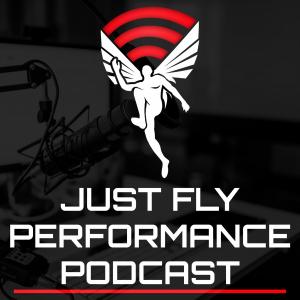Just Fly Performance Podcast

Christian Thibaudeau on Power Training Complexes and Athletic Skill Development
Today’s show is with Christian Thibaudeau. Christian has been a strength coach for nearly 2 decades, working with athletes from nearly 30 sports. He has written four books and has pioneered multiple educational courses, including the Neuro-typing system, which goes in-depth on how to train athletes in the weight room (and beyond) based on their own individual dispositions. I have had Christian on the podcast many times talking about neuro-typing, but more recently I’ve been digging into his knowledge of various types of training repetitions (Omni-rep) which we talked about on podcast 221. As per any strength coach I am aware of, Christian has the greatest knowledge of set-rep schemes and combinations available for training, and, as such, I have really enjoyed the chance to speak to him on the terms of training complexes and schemes. On the show, Christian gets into power training complexes, and the possibility of utilizing sport skills in the total framework. He also talks about how to periodize and assign the use of complexes, as the method “costs” more in terms of the adaptive resources of the athlete. Finally, Christian spends time talking about training stimulus, and how to create the “purest” possible adaptation for an athlete with the minimal amount of noise in the system, ending with a description of his double and triple progression systems. The interesting thing with this talk was that it was almost more about what not to do, than what to do. In times like these, where coaches are armed with a massive arsenal of possibilities at their fingertips, the need for wisdom on how to actually utilize and progress the methods, without adding excess noise to the system, is at a premium. Today’s episode is brought to you by SimpliFaster and Lost Empire Herbs. For 15% off your Lost Empire Herbs order, head to www.lostempireherbs.com/justfly View more podcast episodes at the podcast homepage. Timestamps and Main Points 5:45 – Recent insights from Christian on watching his children grow and mature in regards to sport preference, behavior and physical abilities 13:30 – Christian’s thoughts on introducing specific sport skills into power training complexes 25:45 – Why more movements in a complex is more neurologically demanding, and how to choose how many exercises in a complex, based on the type of athlete you are working with 32:15 – Christian’s take on when to use (or not use) power complexes in a training year, based on the athlete 47:45 – How to increase training stimulus, and how to progress in training without adding volume, or even weight 59:45 – Why it is important not to give a client what you, as a coach, are currently in love with in terms of training methods 1:05:45 – How to make training the “purest” it can possibly be, reducing all un-necessary noise in a program to help athletes adapt in as direct of way that is possible 1:12.00 – Christian’s take on using bar-speed monitor units for athletes in light of adrenaline increases and intensification factors 1:22.00 – Using very simple lifts, such as a leg press, in order to put minimal stress into a training program where an athlete is doing a non-strength sport 1:28.00 – Christian’s simple-strength progression method, the “triple progression method” that offers a low level of noise and a long-term progression potential for an athlete “The simple fact that it feels lighter (doing a light set, after doing a heavy set), it will make you more confident, and you will produce more force” “The closer both movements are together, the easier the brain will connect both (for the brain to transfer to sport skill)” “That’s one of the issues with complexes is that they will raise adrenaline more than any training benefit you can find; which is a benefit in the short term… the downside of that is the more adrenaline you produce in training, the more likely you are to suffer from training burnout”






 Visit Podcast Website
Visit Podcast Website RSS Podcast Feed
RSS Podcast Feed Subscribe
Subscribe
 Add to MyCast
Add to MyCast